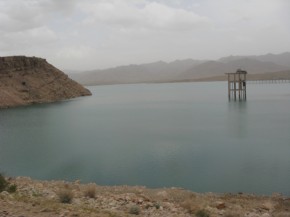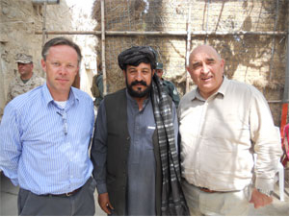I was fortunate enough to join the UK Ambassador's visit to Kajaki – a remote and volatile district in Northern Helmand where the surrounding mountains contrast against blue skies and the crystal clear waters of Kajaki Lake.

Many of you may have heard of Kajaki in relation to the Kajaki Dam - one of the two major hydroelectric power dams in Helmand province. It operates with two turbines, providing electricity to Southern Afghanistan and irrigating some 650,000 acres of land.
Building on earlier military efforts by the British, the Afghans and ISAF, the installation of a third turbine is planned by USAID. In addition, the UK in partnership with other donors plans to build a new hydropower station close to Gereshk, the commercial capital of Helmand.
Given the strategic importance of this area, it has been subject to fighting between insurgents and the Afghan and international security forces. We visited a small memorial in Kajaki to pay tribute to the British soldiers who lost their lives securing this vital dam – a vivid reminder that gains in Afghanistan are often hard won. US and Afghan forces now help protect this area.
The aim of the visit was to demonstrate international support for the recently appointed District Governor of Kajaki, Mullah Sharif Uddin. A meeting was convened with the local shura, an informal body that represents the community consisting of around 50 local elders. The meeting was held outside under vines providing some valuable shade in the middle of the day. As the local elders crowded into the meeting space, their expressions conveyed calm anticipation.

For many this was the first time they had seen the new district governor and certainly the first time they had met a senior representative of the international community, the UK Ambassador, face to face. It was an opportunity to share their concerns and aspirations, as well as a chance to try to get some answers.
Given recent improvements in security, I expected issues around basic levels of health care and education provision to be raised. Instead, security concerns dominated the conversation. The local elders were animated in their description of the struggles they face, with many of them finding themselves caught between the insurgency and international security forces.
Indeed, an elderly bearded member of the local shura commented that 'there's no point talking about education and health care until security is improved.' A sobering reminder that much of the progress we are seeking to achieve at the local level requires a basic level of security for local government to function.

The introduction of the new district governor is a sign of recent progress and the start of efforts to reconnect local citizens with the state. It is hoped that, with further improvement in security and the introduction of basic services, local people will start to trust more in the government and be dissuaded from supporting the insurgency.
Another example of the government extending its influence within the district can be found in nearly 130 Afghan National Police officers stationed at Kajaki. The US Marines based there say their Afghan counterparts have proven themselves in action against the insurgency.
While many people have paid a heavy price in this region, they are also anxious not to return to the violence of the past – and the introduction of local government gives people hope for a better future.

1 comment
Comment by Pablo Jerome posted on
Well written article. It will be helpful to anybody, including me. Continue the good work. I cannot wait to read more posts.